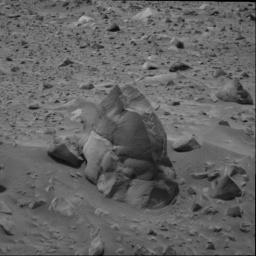Heading for Humphrey
Caption:
This image of the rock called "Humphrey" was taken by the navigational camera on the Mars Exploration Rover Spirit during its 54th sol on Mars. The rock's name was inspired by Humphries Peak - the tallest peak in Arizona and part of the San Francisco volcanic complex. Standing approximately .6 meters (about 2 feet) tall, "Humphrey" is one of the largest blocks of what scientists believe is ejected material from one of the rover's long-term targets, the crater dubbed "Bonneville." Likely a basaltic rock, the fractures in "Humphrey" are thought to have been caused by the impact as it was hurled from the crater to its current resting place. Scientists are eager to investigate ejecta rocks, as they give a glimpse of the composition of materials that lie beneath the martian surface. Spirit's engineering and science teams are preparing to brush and then grind "Humphrey" with Spirit's rock abrasion tool. The hope is to remove as much dust as possible so they can examine the coating before grinding, and then study the exposed undersurface after grinding with the cameras and the miniature thermal emission spectrometer.
Cataloging Keywords:
| Name |
Value |
Additional Values |
| Target |
Mars |
|
| System |
|
|
| Target Type |
Planet |
|
| Mission |
Mars Exploration Rover (MER) |
|
| Instrument Host |
Spirit (MER-A) |
|
| Host Type |
Rover |
|
| Instrument |
Navigation Camera (Navcam) |
|
| Detector |
|
|
| Extra Keywords |
Crater, Dust, Grayscale, Impact, Thermal, Volcano |
| Acquisition Date |
|
| Release Date |
2004-02-28 |
| Date in Caption |
|
|
| Image Credit |
NASA/JPL |
| Source |
photojournal.jpl.nasa.gov/catalog/PIA05466 |
| Identifier |
PIA05466 |

